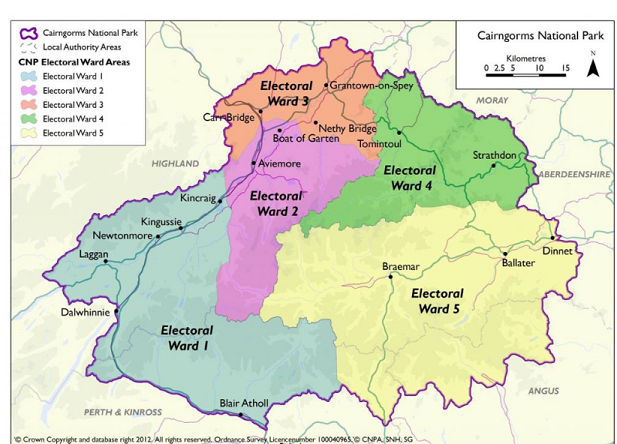
A couple of weeks ago the Cairngorms National Park Authority started to advertise their local member elections which are due to take place on 21st March 2019 (see here). They are trying to encourage more people to stand and to ensure that residents are registered to vote. Both initiatives are very welcome. As part of this initiative they have started to hold sessions – slightly short notice – on what its like to be a Board Member (see here). The remaining three sessions are: 3rd December, V&A Halls, Ballater; 13th December, Discovery Centre, Tomintoul; 17th December, The Hub, Aviemore.
The CNPA appears far better prepared than the Loch Lomond and Trossachs National Park Authority who started promoting their elections earlier this year at a relatively late date. This gave people very little opportunity to decide whether to stand or not (see here) and, as far as I am aware, no attempt was made to encourage new voter registration. But then the CNPA has, for some time, appeared to value its local members more than the LLTNPA where control has lain with Scottish Government appointees.
There are still, however, some fundamental defects in the local member election process, most notably the capping of expenses at £100. Effectively this means candidates can produce one election leaflet, which gets distributed with the voting papers. This is far too late to inform voters choices. The expense limits doesn’t allow candidates to make themselves known at an earlier date, for example by hiring a hall and advertising a public meeting. This makes it very difficult for candidates to promote what they stand for through their own efforts. It gives existing local members and politicians, who also have political parties behind them, a considerable advantage.
Election law for our National Parks is very unlikely to change before March next year. The discriminatory effect of the rules on election expenses can however be offset if local organisations support the democratic process. Local newspapers have a key role to play in this. The west side of the National Park still has an excellent local paper, the Strathy, which still provides real news and is well placed to fulfil this function. Local community organisations can also play a key role by organising election hustings, which do not count as election expenses.
Our National Parks, however, could do more. I don’t see why they should not encourage all candidates to submit an election statement for publication on the Elections 2019 section of their website soon after nominations close. This would help make the public more aware of who was standing. It would give voters time to lobby candidates and ask them questions before deciding how to vote.
In the LLTNPA voters had little time to do this. Election addresses were distributed at the same time as voting papers (the vote is postal), a saving on money at the expense of democracy. What’s more it appears that candidates were strongly discouraged from raising some of the most important issues facing the National Park. It appears that candidates were told, for example, that if they commented on planning issues such as the Flamingo Land development, that would preclude them from voting on those issues if elected. This could explain why there was so little debate about Flamingo Land during the election process despite the huge interest in the local community. (I have submitted an FOI request to ascertain exactly what candidates were told they could say). From a democratic perspective, however, it appears wrong that a candidate in the Cairngorms National Park elections should not be able to stand, for example, on a ticket of either supporting or opposing the An Camus Mor development. And then, if elected, vote on this.
Having advertised the elections early, it will be interesting to see if the CNPA Board Meeting on 17th December considers what further actions could be taken to make the National Park local election process more democratic. Board Members, if encouraged, are likely to have lots of ideas. They could set an example not just for National Parks but to other public authorities, like Councils.

When we elect politicians to the Scottish or UK Parliaments they can participate in any business that comes before those Parliaments and vote on any matter. Any views that they have expressed on any matter before being elected do not constrain them in the exercise of their parliamentary responsibilities. The same principle should apply to anyone elected to a national park body. Yet another example of the need for the Loch Lomond and Trossachs National Park to bring its operational procedures up to standard.